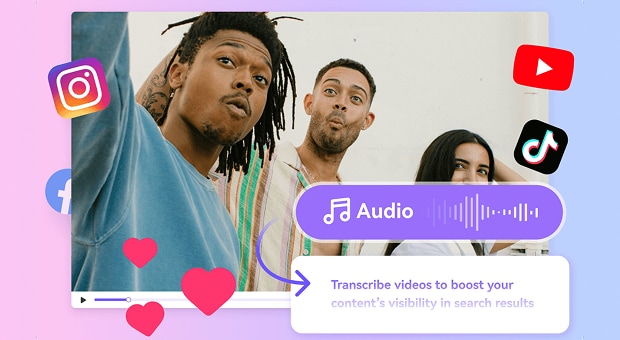Have you ever faced that frustrating moment when you need to transcribe audio in different languages but can not identify what language is being spoken? Whether for research, content creation, or international businesses, manually processing multilingual audio can consume hours of your valuable time. This problem becomes even more complex when different accents come into play.
This guide will explore how to efficiently detect languages from audio files in batch processing mode. You will discover the essential features to look for in speech-to-text software, learn a step-by-step process for batch language detection, and pick up expert tips to achieve maximum accuracy.
In this article
Part 1. What Should a Qualified Speech-to-Text Software Contain
A high-quality speech-to-text solution should have multilingual support, batch processing, accent recognition, and more to detect language from voice seamlessly.
Multi-Language Support
The ability to detect and transcribe numerous languages and regional accents is crucial for global content. For example, a quality tool should handle not just major languages like English and Spanish but also less common ones like Finnish or Thai without requiring separate software installations.
Batch Processing Capabilities
Converting batch audio files simultaneously saves significant time compared to processing files individually. Imagine processing 10 interview recordings simultaneously instead of uploading and converting one by one.
Accent Recognition
The software should accurately interpret various accents within the same language and distinguish between British, American, and Australian English. This becomes particularly important when processing international conference calls or global team meetings where teams speak the same language but with different regional pronunciations.
High Accuracy Rate
The transcription should remain reliable with minimal errors, even with background noise or multiple speakers. A truly effective system should achieve at least 90-95% accuracy even in challenging environments.
Customizable Dictionary
The option to add specialized terminology or industry-specific vocabulary ensures proper transcription of technical terms. For example, medical professionals need accurate transcription of anatomical terms, while IT specialists require correct rendering of technical acronyms and product names.
Accurate Batch Language Transcriber from Audio for Win and Mac
Part 2. How to Batch Detect Language Accent From Audio
To batch detect language from audio, online and offline tools like Wondershare UniConverter, Otter.ai, and Google Cloud Speech-to-Text can be beneficial. Below, we will discuss each tool in detail, including its key features, pros, and cons, to help you make the right choice.
1. Wondershare UniConverter
Wondershare UniConverter is a powerful solution for detecting language from audio files. With its AI-powered speech-to-text technology, it converts your audio into text with more than 95% accuracy in just moments. What makes it exceptional is its ability to handle 50+ languages while maintaining precision even with different accents, making it perfect for content creators, business professionals, and anyone working with multilingual content.
![]()
Key Features
- UniConverter handles over 50 languages with various regional accents for global accessibility with accuracy.
- It seamlessly converts multiple audio and video files and detects language simultaneously with just a few clicks.
- Advanced AI algorithms ensure high-quality transcription even with noisy audio or video files.
- UniConverter can directly convert video content into an editable text format and remove noise from video and audio with its Noise Remover feature.
Pros & Cons
2. Otter.ai
Otter.ai is mainly a meeting assistant that detects voice language and captures accents. It provides automated real-time transcription, summaries, and action items for business meetings and seamlessly integrates with Zoom, Google Meet, and Microsoft Teams.
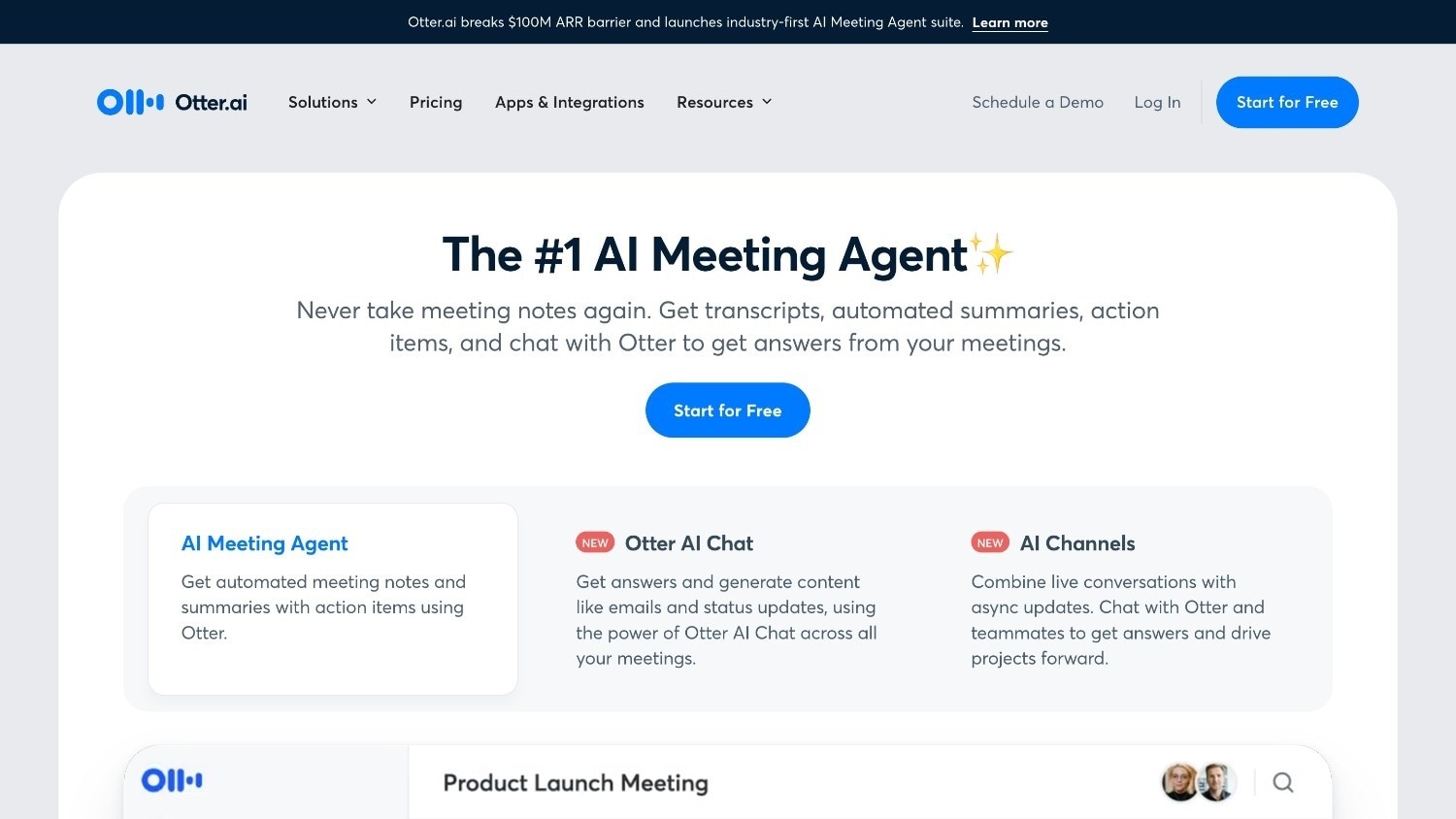
Key Features
- Real-time transcription and automated meeting summaries in 3 languages with accent understanding.
- A voice-activated AI meeting agent that can answer questions and complete tasks during meetings.
- Seamless integration with tools like Zoom, Teams, and Slack.
- AI chat will summarize the key points from the meeting audio.
Pros & Cons
3. Google Cloud Speech-to-Text
Google Cloud Speech-to-Text is a versatile tool that helps you detect language from audio and convert speech into accurate text. It supports more than 125 languages and accents for real-time and recorded files.
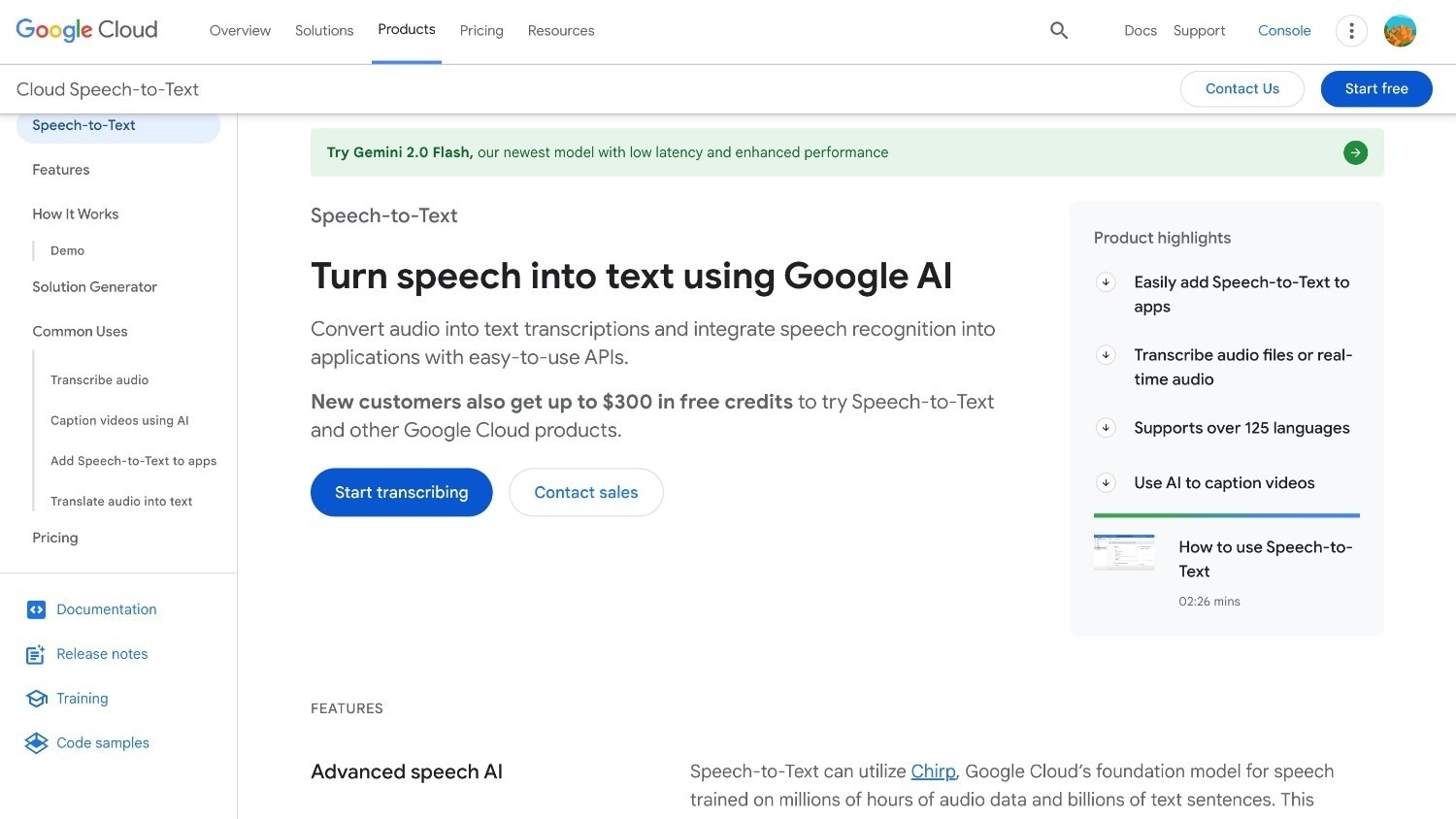
Key Features
- Support transcription in 125+ languages, ideal for global use
- Real-time and audio transcription, including streaming audio
- Advanced AI models for improved accuracy and accent recognition
- Customizable models and vocabulary to fit specific industry needs
Pros & Cons
4. Speechmatics
Speechmatics is a speech technology that helps businesses detect languages from voice and deliver accurate, real-time transcription in 50+ languages and diverse accents. Its Voice Agents API enables natural, responsive, and secure voice interaction, making it ideal for global interactions.
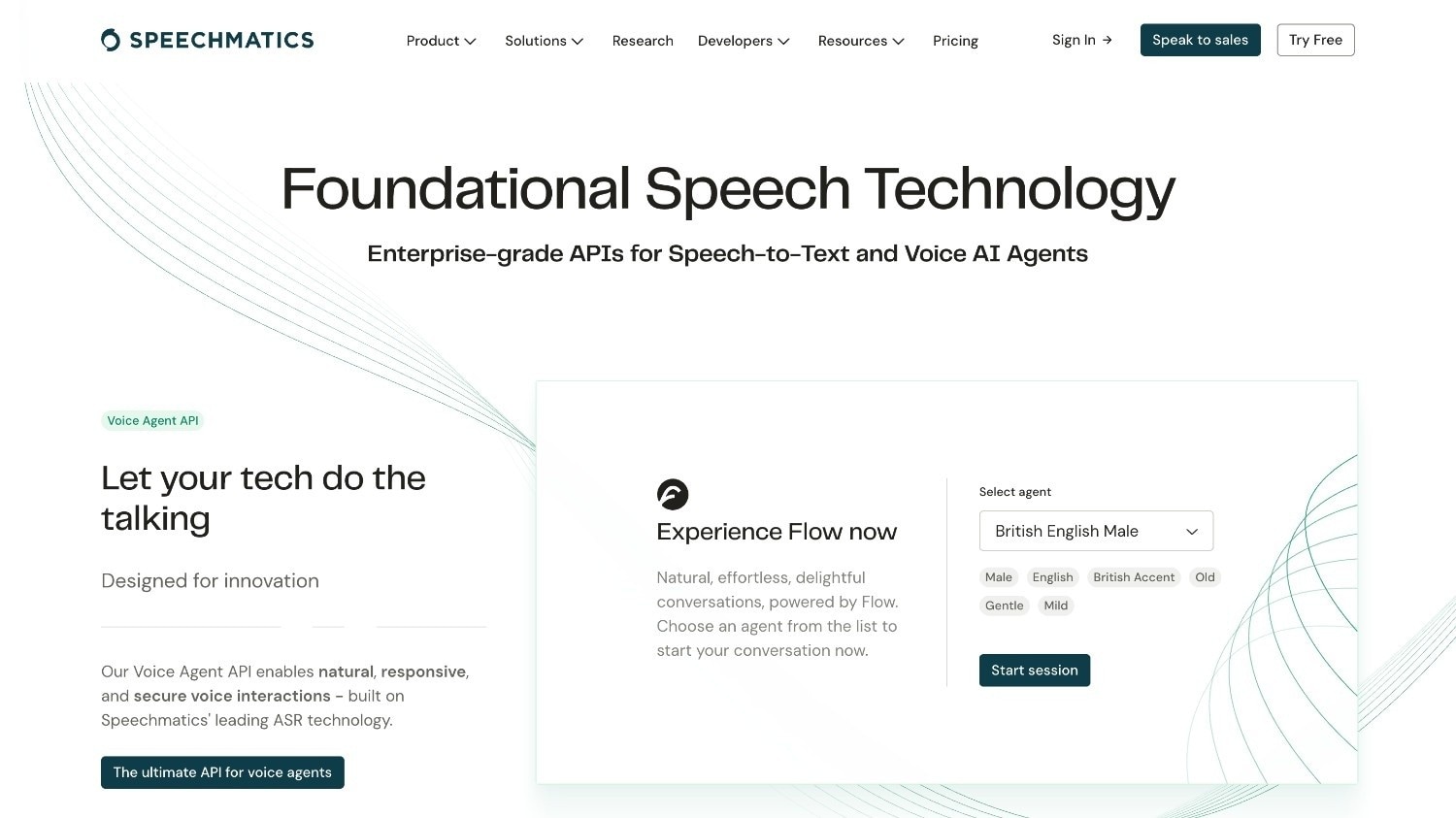
Key Features
- Real-time transaction with accuracy
- Automatic language identification to detect language from audio before transcription
- It supports more than 50 languages and a wide range of accents and dialects
- It supports speaker identification and custom dictionaries
Pros & Cons
5. oTranscribe
oTranscribe is a free, web-based tool that makes manual transcription easier by letting you control audio or video playback and time in the same window. It is perfect for those who want to detect voice language and transcribe interviews or lectures in multiple languages.
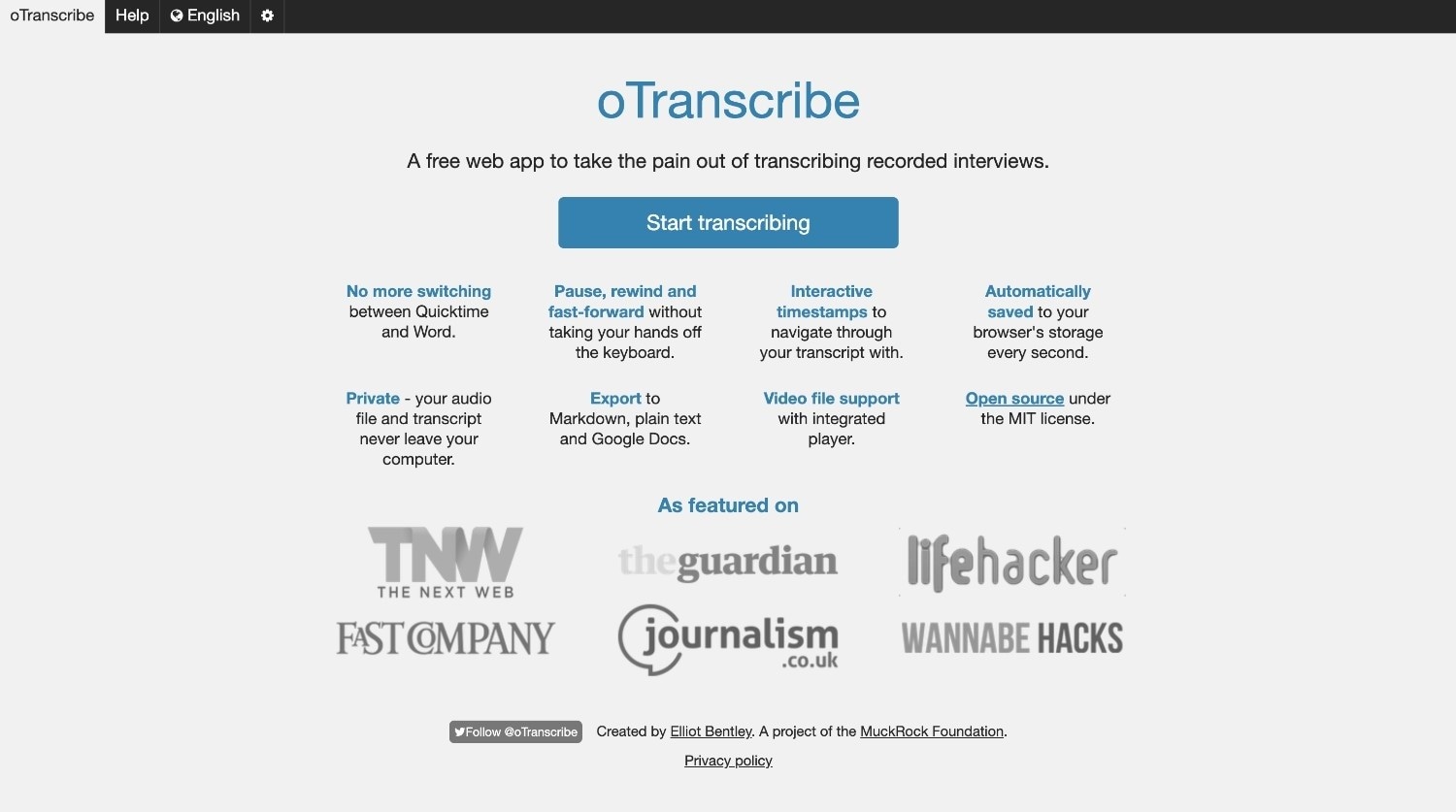
Key Features
- Simple HTML web app for cross-platform use
- Keyboard shortcuts for easy playback, rewind, and fast-forward
- Interactive timestamps for quick navigation
- Multiple export options like markdown, plain text, and as Google Docs
Pros & Cons
Accurate Batch Language Transcriber from Audio for Win and Mac
Part 3. Bonus: How to Generate and Translate Subtitles in Videos
Wondershare UniConverter’s Subtitle Editor can generate and translate subtitles along with language detection from audio. It generates subtitles and lets you translate them in multiple languages, which helps you reach a global audience. Moreover, you can choose the font style of the subtitle and adjust the transparency to give a more personalized experience.
![]()
By following these simple steps, you can generate and translate your subtitles quickly and easily:
Step 1
On the homepage, click Video, select Subtitle Editor, and upload your video.
![]()
Step 2
Here, you have multiple options for adding subtitles. You can generate subtitles by clicking Auto-Subtitle Generator, add text to subtitles, or add subtitles manually by clicking Manual Subtitle.
![]()
Step 3
Once you have completed adding subtitles, click Translator and choose the language in which you want the subtitles generated.
![]()
Step 4
When you are done adding subtitles, click the Export button in the lower right corner and download the file as an MP4, SRT, or Project file.
![]()
Plus Point: When adding subtitles, click the Style option on the right side of the Edit option to select the text style and color.
![]()
Part 4. Expert Tips for Precise Audio Language Detection Results
These tips can help you maximize accuracy when you detect language from audio files.
Clean Audio Quality
Make sure your audio is free from background or other environmental noise, which can disrupt accuracy. Use a noise-canceling microphone or record in a quiet environment for better results.
Use Appropriate Sampling Rates
A higher sampling rate (16 kHz or above) typically leads to better language detection accuracy. Higher sampling captures more phonetic nuance and tonal variations that are important for differentiating between similar-sounding languages like Portuguese and Spanish.
Segment Long Audio Files
Breaking down recordings longer than 30 minutes into smaller chunks can improve processing precision. Most language detection tools are optimized for shorter clips, which helps maintain consistent accuracy throughout the transcription process.
Speaking Consistency
If your audio content has more than one speaker talking to each other, make sure each speaker speaks one by one without overlapping. This helps to detect language accents from audio.
Part 5. Conclusion
Detecting languages from audio with accent recognition can change how you handle multilingual content. While automatic language detection remains challenging, tools like Wondershare UniConverter bridge this gap with 50+ language support and accent recognition capabilities. As AI continues to evolve, batch processing with UniConverter offers the most practical solution for managing multilingual audio content efficiently while maintaining professional quality standards.
Accurate Batch Language Transcriber from Audio for Win and Mac
FAQs
-
1. Can AI recognize languages?
Yes, AI can recognize languages from audio with increasing accuracy. Modern AI systems use deep learning algorithms trained on vast multilingual datasets to identify distinctive phonetic patterns, intonation, and speech rhythms unique to each language. -
2. What types of audio files are supported for language detection?
Most language detection tools support common audio formats like WAV, MP3, M4A, and FLAC. Some also handle video files or streaming audio, making them versatile for different use cases, from interviews to live meetings. -
3. Does background noise affect the accuracy of language detection?
Yes, audio or video with background noise, overlapping speakers, or poor recording quality can confuse AI models and lead to more inaccuracies that require manual correction. -
Is it possible to customize language detection for specific accents or dialects?
Many tools allow customization. You can add industry-specific vocabulary or prioritize certain accents and dialects. This helps improve accuracy, especially in specialized fields or when working with regional language variations.

